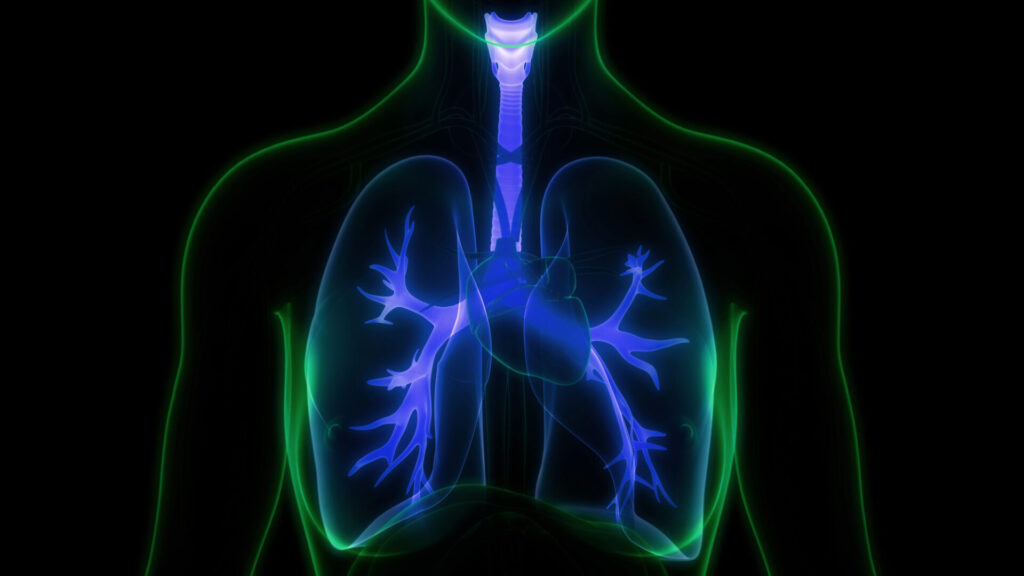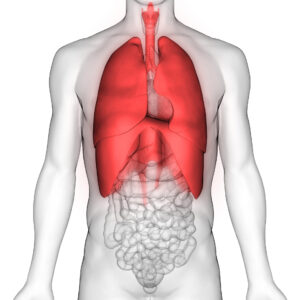Managing chronic pulmonary diseases can be challenging, with factors such as air pollution and COVID-19 compounding the issue. Microbial imbalances in the gut microbiome also contribute to the development of chronic lung diseases through the gut-lung axis. New research supporting modulation of the gut microbiome may offer a solution for patients with lung inflammation, asthma, chronic obstructive pulmonary disease (COPD), long COVID, and other respiratory conditions.
What is the Gut-Lung Axis?
The gut microbiome communicates across multiple axes throughout the body, including the gut-lung axis. Microbes in the gut influence systemic immune responses by producing metabolites that modulate inflammatory pathways and support pulmonary function. Gut microbiome dysbiosis is associated with lung disease through the gut-lung axis.1 Most axes are bidirectional, sending signals back to the gut. In the case of the gut-lung axis, systemic hypoxia and oxidative stress seen in COPD and other diseases may further drive gut dysfunction.2
The lung also has its own microbiome, which is seeded from the gut and oral cavity directly and through micro-aspiration. Patients with respiratory disease have different gut and lung microbiome signatures compared to healthy individuals.3-5
How Does the Gut Microbiome Influence the Lungs?
The gut microbiota is a metabolically active community, and its byproducts, both beneficial and detrimental, have far-reaching systemic effects. For example, beneficial bacteria ferment fiber to produce short-chain fatty acids (SCFA), which are anti-inflammatory.
SCFAs affect immune cell function and inflammatory cytokine levels, including TNF-α, IL-2, and IL-6, as well as anti-inflammatory IL-10. Gut dysbiosis diminishes SCFA production, thus impairing the body’s ability to regulate systemic inflammation. This contributes to lung inflammation.6 In mice with emphysema, restoring the commensal gut microbiota and feeding a high fiber diet resulted in increased SCFA, reduced inflammation, and improved lung structure.7 Several bacterial species produce SCFA, including Lactobacillus probiotic species and others.
Proteobacteria is one of the most abundant gut microbiome phyla, made up of several known Gram-negative pathogenic bacteria. Proteobacteria are implicated in metabolic disorders, inflammatory bowel disease, and lung diseases.5 Increased gut proteobacteria upregulate matrix metalloproteinase 9 (MMP-9) activity, causing lung tissue damage and chronic lung diseases.1 MMP-9, as a biomarker, assesses neutrophilic inflammation and extracellular matrix degradation. Elevated levels are associated with increased COPD exacerbation.8
Several inflammatory cytokines and pathways are implicated in respiratory inflammation. Neutrophilic inflammation is common in many chronic lung diseases, and cytokines, including C-reactive protein (CRP), assist in neutrophil recruitment and the inflammatory response.1 Another proinflammatory cytokine, interleukin 6 (IL-6), increases in response to lower airway dysbiosis.3 Probiotics and herbs affect these inflammatory cytokines and inflammatory pathways.
resB® Lung Support Probiotic
Probiotic supplementation has been shown to support respiratory health. A novel probiotic and herbal blend, resB®, modulates the gut-lung axis and is the first formulated strain-specific probiotic targeting the lungs. The formula contains 30 billion CFU of specific probiotic strains, including Lactobacillus plantarum RSB11®, L. acidophilus RSB12®, and L. rhamnosus RSB13®.
The formula also contains 240 mg of vasaka (Adhatoda vasica) root extract, holy basil (Ocimum sanctum) leaf extract, and turmeric (Curcuma longa) root extract. These herbs act through the gut-lung axis and have traditionally been used and clinically researched to support respiratory health.1,9-11
resB® was developed by neonatologist and pulmonary microbiome researcher, Dr. Vivek Lal. “resB works on multiple levels,” said Dr. Lal. “The herbal components help reduce inflammation, neutralize oxidative stress, and support bronchodilation and mucus clearance. At the same time, the probiotic strains rebalance the gut microbiome and boost short-chain fatty acid production, which is often low in people with asthma and other chronic respiratory conditions.”
“As physicians, we demand scientific rigor, and most supplements on the market don’t meet that standard,” said Dr. Lal. “With resB, we’ve invested in the full preclinical and clinical pathway because that’s the only way to ensure credibility, efficacy, and trust, both for doctors and patients.”
resB® Preclinical Studies and Mechanisms
An in vitro model of lung inflammation exposed gut and lung epithelial cells to proteobacteria, then treated with resB®. resB® decreased inflammatory MMP-9 activity. Each resB® ingredient was tested, and both the ingredients alone and in combination with the resB® blend decreased MMP-9 expression. The synergistic effect of the formula performed best.1
In vivo, mice were exposed to intratracheal proteobacteria-derived lipopolysaccharide (LPS), then treated with resB®. LPS is a major membrane component of Gram-negative bacteria, including proteobacteria. It’s commonly used in preclinical studies to promote systemic and tissue-specific inflammation. Mice treated with resB® had decreased neutrophil recruitment and inflammatory markers in bronchoalveolar lavage fluid, serum, and lung tissue compared to untreated mice.1
resB® Clinical Studies
Chronic Obstructive Pulmonary Disease (COPD)
COPD is characterized by progressive tissue damage and loss of lung function. Emphysema and chronic bronchitis are both forms of COPD. COPD patients have a distinct gut and lung microbiome signature compared to healthy individuals, suggesting the gut-lung axis may play a role in COPD pathogenesis.12
A randomized, double-blinded, placebo-controlled study evaluated the impact of resB® in 37 volunteers with COPD. Participants took 2 capsules resB® or placebo daily for 12 weeks. Quality of life was assessed using Saint George’s Respiratory Questionnaire (SGRQ). Participants receiving resB® had statistically significant improvement in their SGRQ symptom scores from baseline to final visit, which was not observed in the placebo group. This supports the potential for resB® to improve the quality of life in COPD patients.
Serum and sputum were also assessed for effects on inflammation. Serum and sputum MMP-9 and serum IL-6 decreased significantly in the resB® group from baseline until week 12 and compared to placebo. Serum CRP levels were significantly lower at week 12 compared to baseline in the resB® group, but not between resB® and placebo. These changes suggest that resB® reduces inflammation via the gut-lung axis.
The effect of resB® on the gut microbiome was assessed via a stool sample, and the lung microbiome via a sputum sample. The resB® group had a significant increase in stool Lactobacilli abundance and stool and sputum Veillonella relative abundance. These changes suggest that the probiotic and herbal blend favorably modulates the gut and lung microbiome. These species are more dominant in healthy adults. The formula was safe and well-tolerated, with few adverse reactions reported.3
Asthma
A pilot study assessed the safety of resB® for 4 weeks in 11 healthy and 11 asthmatic participants. Participants with asthma were on stable medication for at least 3 months. All participants took the supplement twice daily. At baseline and week 4, serum SCFA and spirometry were measured, and SGRQ was assessed. A stool sample was collected to assess the gut microbiome at 2 and 4 weeks.
Spirometry assessed forced expired volume in 1 second (FEV1) and forced vital capacity (FVC). Improved lung function was observed in asthmatic participants taking resB®. Supplementation with resB® resulted in significantly increased FEV1% by 8.5%, with higher FEV levels indicating better lung function. FVC also trended higher, though not statistically significant. No changes were observed in the healthy group.
SGRQ scores did not significantly change, although asthmatic participants trended toward significance with the impact component. Impact components include social functioning and psychological disturbance resulting from airway disease. Of the participants who smoke, have asthma, or both, 36% noticed improvement in overall health, 43% less frequent coughing, 43% fewer instances of shortness of breath, and 29% fewer cough or breathing-related sleep disturbances. Study authors note that 4 weeks may not be enough time to see meaningful changes.
Most samples were not colonized with Lactobacillus strains at baseline but were detected after resB® supplementation. All three Lactobacillus strains increased significantly from baseline to week 4 in asthmatic participants. Other studies have shown that administering Lactobacillus may help regulate the Th1/Th2 immune response, leading to a reduction in the allergic inflammation commonly seen in asthma.
The probiotic blend in resB® affected gut microbiota production of SCFA. Serum levels of beneficial SCFAs increased significantly in asthmatics but not in the healthy population, suggesting a pre-existing deficiency that was addressed through supplementation.
There were robust differences in the microbiota of asthmatic compared to healthy individuals, including increased proteobacteria Escherichia coli. Gastrointestinal E. coli has been linked with increased respiratory disease risk.
There were no adverse events, and resB® was well-tolerated. This study is promising, and larger trials are needed to confirm the data.6
Long COVID and Other Respiratory Insults
The lungs are particularly susceptible to environmental irritants, including pollutants, allergens, and cigarette smoke, as well as infections. Several human studies have shown that although the respiratory tract is the primary organ affected by pollution-mediated dysbiosis, distal organs, such as the gut, are also significantly impacted.4 For example, smoking cessation resulted in a decrease in harmful gut proteobacteria and an increase in beneficial bacteria and microbial diversity.5,13 Reducing exposure to air pollution and improving gut microbiome health could help protect against the harm caused by air pollution.4
A randomized controlled trial on rural Ugandan women susceptible to indoor air pollution through kerosene lamps supports the gut-lung connection. When households switched to solar lighting, participants had fewer breathing problems. Researchers also found changes in the gut microbiome after the solar lighting was implemented.14
Respiratory infections are also mediated by the gut-lung axis. Long-lasting gut dysbiosis results from COVID infections, playing a role in the pathogenesis of long-COVID and its persistent respiratory symptoms. Therefore, long COVID could be considered a microbiome disorder. Patients with acute COVID who do not go on to develop long COVID have a restored gut microbiome. Interestingly, a fecal transplant from post-COVID patients to mice induced lung inflammation, worse outcomes during pulmonary infection, and poor cognition.15
Probiotic supplementation is well-known for its influence on respiratory outcomes, particularly relating to colds, flu, and other respiratory infections.16,17 Probiotics are a promising treatment for acute COVID, and more research is needed to see if they can help with long COVID.15
Improving Lung Health by Improving Gut Health
“People with asthma and other chronic respiratory conditions often have underlying gut dysbiosis,” explained Dr. Lal. “Targeted probiotics can help restore balance, and the anti-inflammatory effects we see across the gut-lung axis are largely driven by short-chain fatty acids produced by specific gut microbes.”
Restoring balance to the gut-lung axis using resB® is an innovative tool for clinicians to address gut dysbiosis as one of the root causes of pulmonary diseases. resB® is the only supplement of its kind with precision probiotics that specifically target the gut-lung axis.
Related:
A Clinical to Support the Gut–Lung Axis
References:
- Wenger NM, Qiao L, Nicola T, et al. Efficacy of a Probiotic and Herbal Supplement in Models of Lung Inflammation. Microorganisms. 2022;10(11).
- Wang L, Cai Y, Garssen J, Henricks PAJ, Folkerts G, Braber S. The Bidirectional Gut-Lung Axis in Chronic Obstructive Pulmonary Disease. American journal of respiratory and critical care medicine. 2023;207(9):1145-1160.
- Nicola T, Wenger NM, Evans M, et al. Double-Blind Randomized Placebo Controlled Trial of a Lactobacillus Probiotic Blend in Chronic Obstructive Pulmonary Disease. medRxiv : the preprint server for health sciences. 2024:2024.2010. 2002.24314795.
- Mazumder MHH, Hussain S. Air-Pollution-Mediated Microbial Dysbiosis in Health and Disease: Lung-Gut Axis and Beyond. Journal of xenobiotics. 2024;14(4):1595-1612.
- Rizzatti G, Lopetuso LR, Gibiino G, Binda C, Gasbarrini A. Proteobacteria: A Common Factor in Human Diseases. BioMed research international. 2017;2017:9351507.
- Wenger NM, Qiao L, Nicola T, et al. Clinical trial of a probiotic and herbal supplement for lung health. Frontiers in nutrition. 2023;10:1168582.
- Jang YO, Lee SH, Choi JJ, et al. Fecal microbial transplantation and a high fiber diet attenuates emphysema development by suppressing inflammation and apoptosis. Experimental & molecular medicine. 2020;52(7):1128-1139.
- Wells JM, Parker MM, Oster RA, et al. Elevated circulating MMP-9 is linked to increased COPD exacerbation risk in SPIROMICS and COPDGene. JCI insight. 2018;3(22).
- Manarin G, Anderson D, Silva JME, et al. Curcuma longa L. ameliorates asthma control in children and adolescents: A randomized, double-blind, controlled trial. Journal of ethnopharmacology. 2019;238:111882.
- Jamshidi N, Cohen MM. The Clinical Efficacy and Safety of Tulsi in Humans: A Systematic Review of the Literature. Evidence-based complementary and alternative medicine : eCAM. 2017;2017:9217567.
- Shamsuddin T, Alam MS, Junaid M, et al. Adhatoda vasica (Nees.): A Review on its Botany, Traditional uses, Phytochemistry, Pharmacological Activities and Toxicity. Mini reviews in medicinal chemistry. 2021;21(14):1925-1964.
- Bowerman KL, Rehman SF, Vaughan A, et al. Disease-associated gut microbiome and metabolome changes in patients with chronic obstructive pulmonary disease. Nature communications. 2020;11(1):5886.
- Biedermann L, Zeitz J, Mwinyi J, et al. Smoking cessation induces profound changes in the composition of the intestinal microbiota in humans. PloS one. 2013;8(3):e59260.
- Huang CY, Nuwagira E, Tisza M, et al. Effect of household air pollution on the gut microbiome and virome of adult women living in Uganda. Environmental health perspectives. 2025.
- Álvarez-Santacruz C, Tyrkalska SD, Candel S. The Microbiota in Long COVID. International journal of molecular sciences. 2024;25(2).
- Zhao Y, Dong BR, Hao Q. Probiotics for preventing acute upper respiratory tract infections. The Cochrane database of systematic reviews. 2022;8(8):Cd006895.
- Darbandi A, Asadi A, Ghanavati R, et al. The effect of probiotics on respiratory tract infection with special emphasis on COVID-19: Systemic review 2010-20. International journal of infectious diseases : IJID : official publication of the International Society for Infectious Diseases. 2021;105:91-104.






